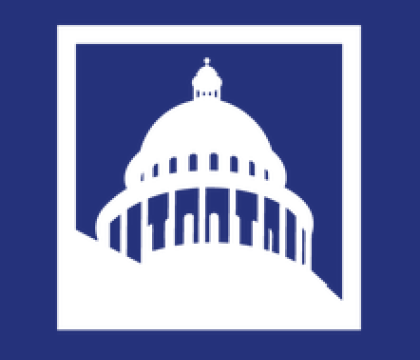Center for the Study of the Presidency and Congress Presidential Fellows Program
For Master's students, Juniors, and Sophomores with a focused research agenda related to the American Presidency and/or Congress, who want to learn about leadership and governance, to share their outstanding research and scholarship, to develop as future leaders of character, and to be inspired to careers in public service. Fellows will participate in group presentations addressing policy scenarios. There is thus a focus on collaborative work in the program to complement policy research writing.
PROGRAM OVERVIEW
The Center for the Study of the Presidency and Congress (CSPC) created the Presidential Fellows Program in 1970 to inspire college students to become the public servants that would guide our nation’s future.
Today, the program continues that mission by providing top collegiate students in the United States and around the world with the opportunity to study the U.S. Presidency, the public policymaking process, and our President’s relationships with Congress, allies, the media, and the American public. Over the course of an academic year, the Fellows learn about leadership and governance, share their outstanding research, and explore careers in public service.
Since its inception, the Fellows Program has developed leadership skills in more than 1,500 students. Many of our Fellows have been awarded the prestigious Rhodes, Marshall, Fulbright, Truman, and Gates Scholarships. Alumni of the Fellows Program also have the distinction of serving in positions such as Capitol Hill and White House staffers, award-winning journalists, CEOs of corporations and non-profit organizations, senior military leaders, and university presidents and deans.
CSPC is excited to announce that for the 2025-2026 Fellowship year, all programming will center on the 250th Anniversary of the United States, which takes place on July 4, 2026.
PROGRAM HIGHLIGHTS
Travel to Washington D.C.
Fellows travel to Washington, D.C. for a leadership conference. During this multi-day event, they discuss today’s most pressing challenges and innovative ideas while interacting with national policymakers and leading experts.
Research
The centerpiece of the Fellowship is a 10-15 page research paper on the key issues of the past, present and/or future as they relate to the Presidency and Congress.
Key Update for 2025-2026 Fellows:
The primary change this year pertains to the required research paper. While Fellows may still choose topics related to the presidency and/or Congress, they must incorporate the theme of the 250th Anniversary into their research.
This means that Fellows should frame their chosen topic within the broader historical narrative of the nation's growth, challenges, and evolution over the past 250 years. The introduction and conclusion of their paper should explicitly connect their topic to the significance of the Anniversary.
For example, a Fellow writing about current immigration policy might begin by discussing America's foundation as a nation of immigrants and highlighting major milestones in immigration policy over the last two and a half centuries.
Publishing and Awards
All students present their research at the leadership conference and are eligible to receive one of five monetary awards for their papers while competing for publication in CSPC’s journal, The Fellows Review.
Global Engagement
Fellows have the chance to network with peers from across the globe through the International Presidential Fellows program. International Fellows from Canada, France, Japan, Mexico, Panama, and South Africa and other countries participate alongside their U.S. counterparts.
Special Events
Over the course of the program, the Fellows attend special events like CSPC’s Annual Awards Dinner, which honors leading public servants including, U.S. Senators, Governors, Cabinet Secretaries, and military leaders. As alumni, Fellows are invited to come back and join CSPC for the Awards Dinner, alumni social events, and other convenings.
BECOMING A FELLOW
Under the guidance of CSPC, the Fellows are selected by their colleges and universities who are partner institutions in the Fellows Program. Stanford University covers travel to and from Washington, DC for one student while the Center for the Study of the Presidency and Congress pays for the lodging and other associated costs for this program.
Fellows can come from any major or specialization, but they all have strong academic credentials, a demonstrated interest in the institutions of the Presidency and Congress, and a desire to make public service a part of their careers. Typically, Fellows are seniors in an undergraduate program, but advanced underclassmen or graduate students can also participate. Upon completion of the program, Fellows join the more than 1,500 alumni who have come before them.
HOW TO APPLY
Complete a campus application package consisting of the following:
-
3-page double-spaced statement of purpose explaining:
- Your reasons for applying to the program
- The research project you intend to pursue as a CSPC Fellow
- Your research experience to date, especially as it relates to your research plans
- Your educational and career goals
- Your resume
- Copy of unofficial transcript
-
A letter of recommendation from a faculty member who knows you well and who will be advising you on the proposed research project (original only, copies not required)
- The letter should address the value of your research to the field, as well as your level of preparedness and your ability to work in teams with peers at CSPC event the letter may be sent by the writer electronically to plaboon@stanford.edu
Selection Process
- A committee of FSI staff and faculty will review
- Nomination by Stanford through the Freeman Spogli Institute for International Studies (FSI)
- Be a currently enrolled sophomore, junior, or 1st year master's student majoring in any field of study. Fellows typically major or minor in one of the following disciplines: economics, history, international relations, philosophy, political science, public health, public policy, communication.
- Demonstrate a strong academic record
- Demonstrate an interest in American government and in the American Presidency or Congress
- Demonstrate leadership skills
- Demonstrate research experience and the ability to write and present original material
